We may receive a commission when you use our affiliate links. However, this does not impact our recommendations.
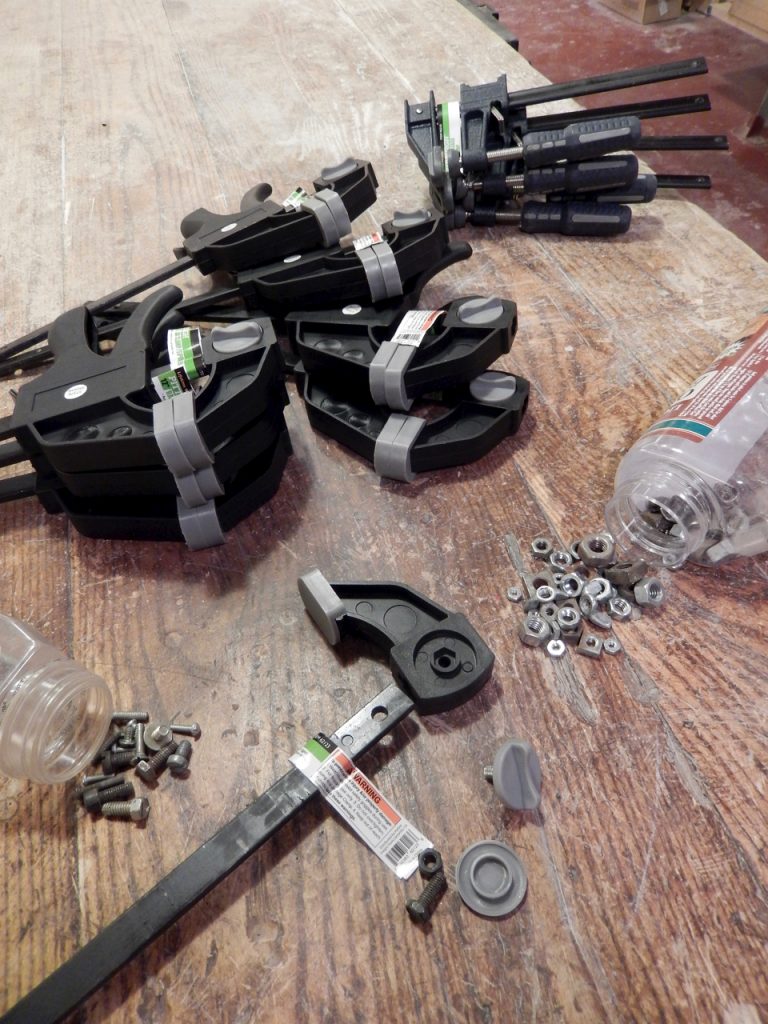
Our new Harbor Freight clamps.
The topics of United States clamp manufacturing and hardware hoarding might seem unrelated, and many of you will certainly think that they deserve two separate entries. In this story, however, I will try to show you how they can be “clamped” together quite successfully.
Recently I decided we needed to add a few more clamps to the woodworking program at school. I wish we could have bought some domestically made clamps, but because of reasons I will lay out below I had to consider alternatives.
When I moved to the United States almost 17 years ago, one could have purchased U.S.-made clamps from three surviving manufacturers: Pony, Wetzler and Hartford. In the last few years, both Wetzler and The Hartford Clamp Co. went out of business. As for Pony (who also made Jorgensen clamps), I can’t give you a definitive answer. But after recently reading that the parent company – Adjustable Clamp Co – got consolidated or changed ownership or something of the sort, I tried calling them to find out if my school could still place an order for replacement parts for our clamps and vises. Unfortunately, I could not get an answer – so perhaps our last domestic clamp manufacturer has closed its doors.
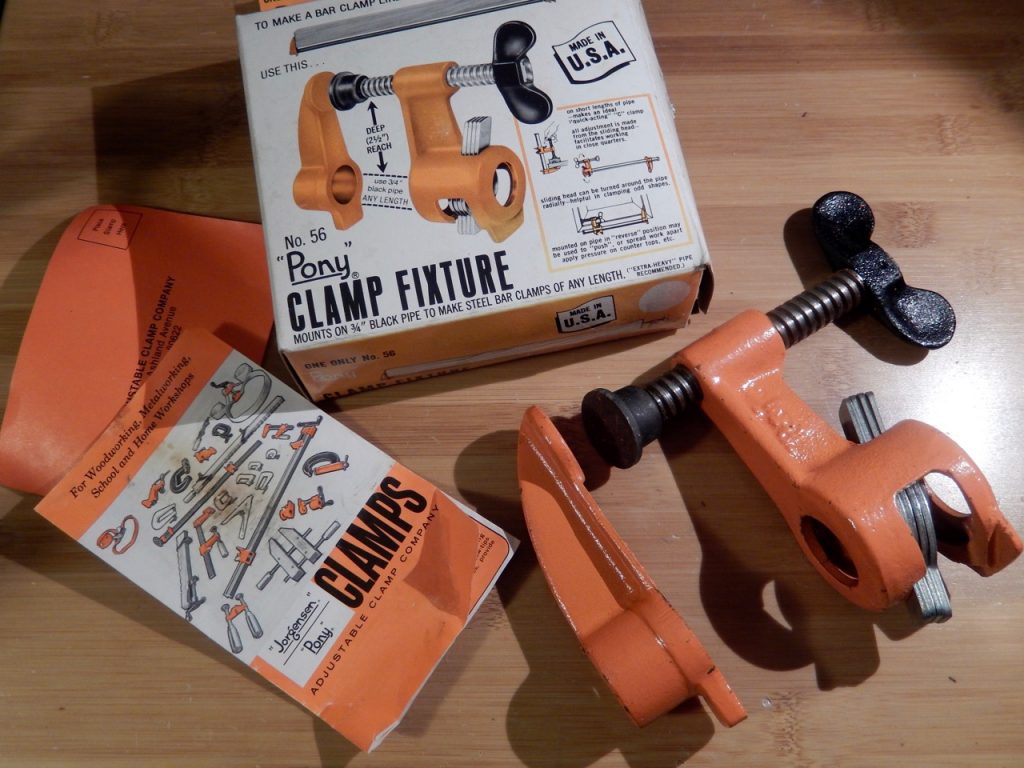
Old stock of 3/4” Pony pipe clamp fixture Made in USA
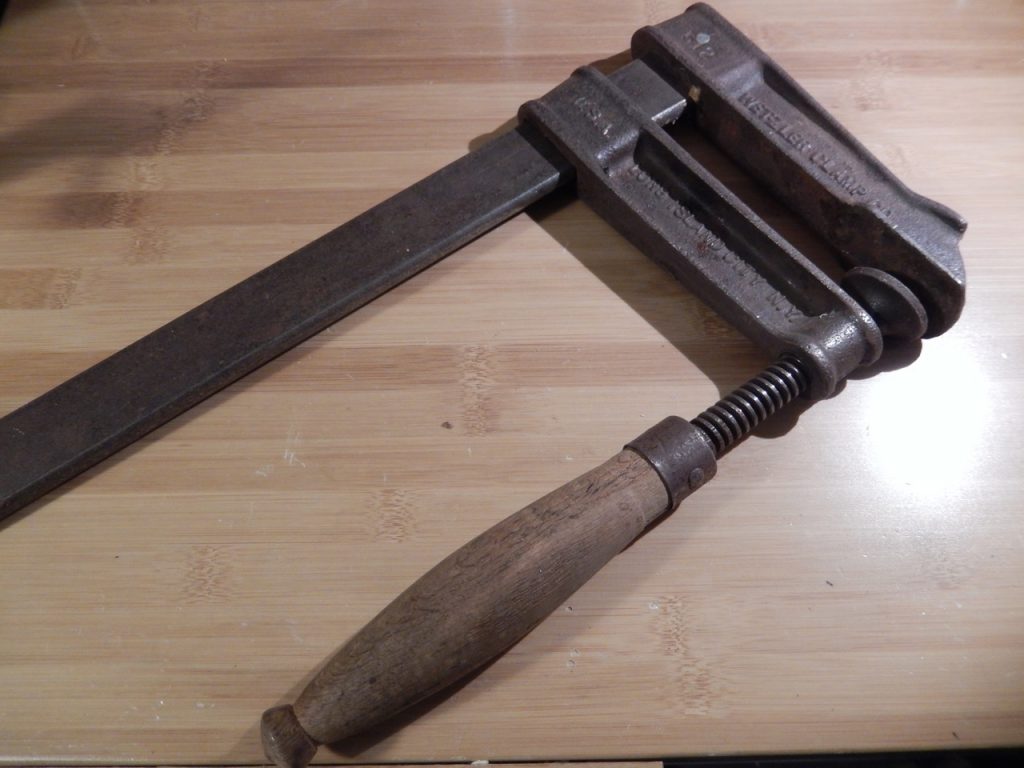
Restored Wetzler clamp with a new oak handle that I turned
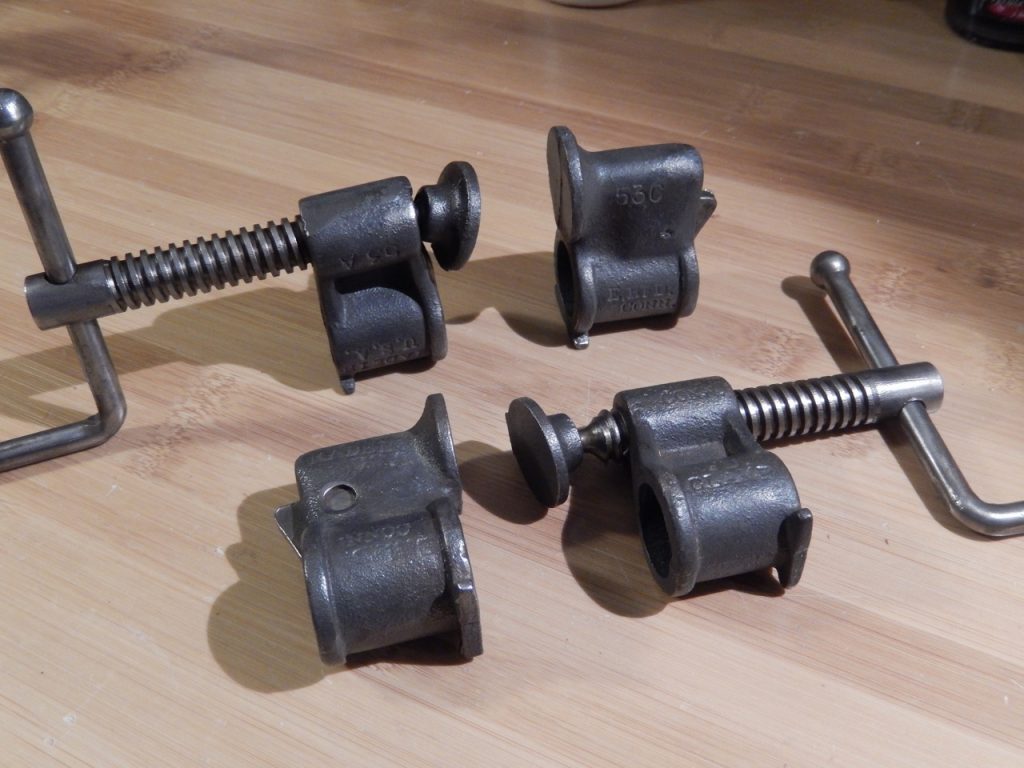
The Hartford Clamp Co. used to make great quality clamps in Connecticut. This was their 1/2” pipe clamp assembly.
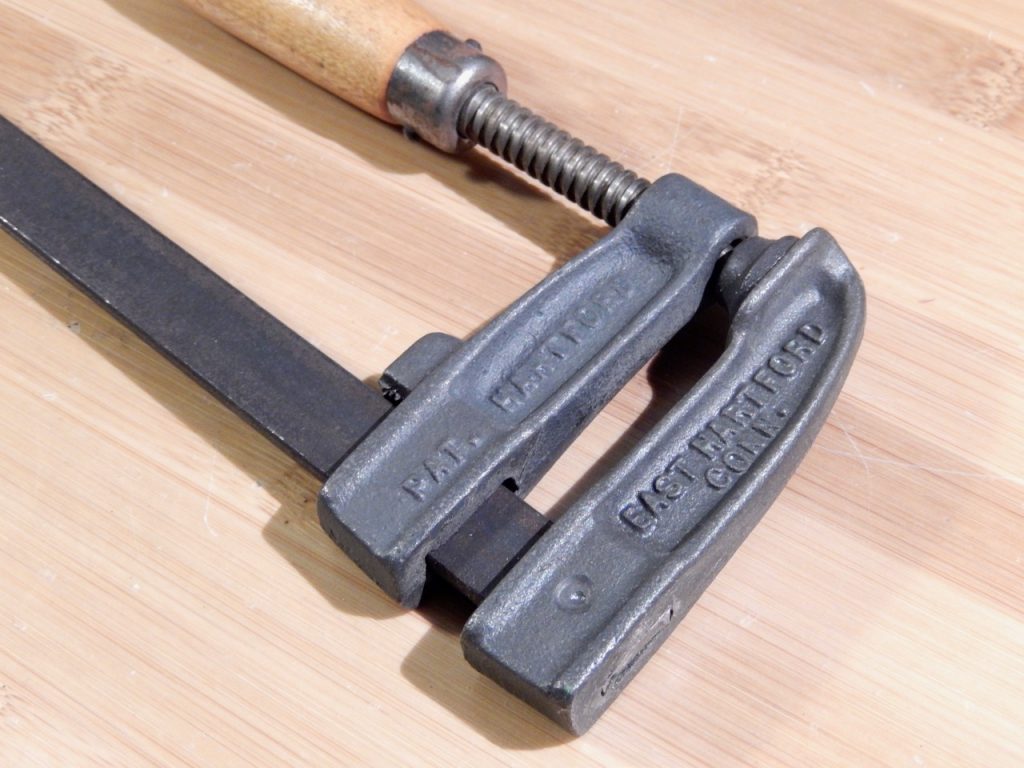
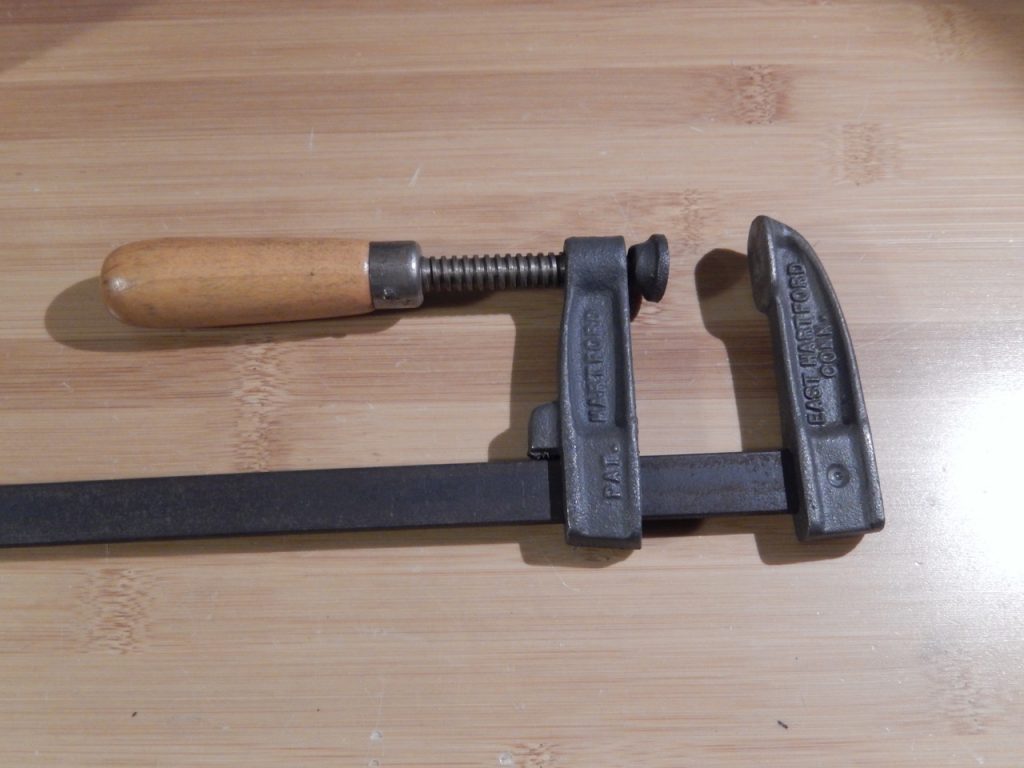
A Hartford’s “F” bar clamp that I bought directly from the company in the early 2000s.
Last month I needed to decide what clamps to buy. And with no U.S. manufacturers to consider, I was left with only these consideration: cost, quality, intended use and, of course, survival rating after possible abuse by students. After reading and watching some reviews on YouTube, I decided to go with Harbor Freight. The two decisive factors were cost and very positive online feedbacks.
We ordered some “C” clamps, quick-action bar clamps and a few F-style clamps. Last week we got them in one big box that evidently had gone through a rough ride before landing on our doorstep. All the clamps got to us safe and sound but one, a 12” quick-action bar clamp had lost a thumb screw nut on the top jaw during the journey. Contacting Harbor Freight was an option but it would have taken time and possibly meant packing and mailing the tool back. All that fuss for just a small nut? I decided to try to fix the problem myself.
And now we arrive to the second part of my story: my claim that hoarding hardware – especially fasteners – almost always pays off.
The history of our woodshop goes back to the beginning of our school, almost 90 years ago. Not surprisingly, I often find tools, tool parts, fasteners and forgotten hardware in boxes, behind cabinets and inside drawers. I try to sort and organize them becuase I know from experience that karma, fate and chance may very likely mean I’ll find a use for them down the road. And that was exactly the case with the missing Harbor Freight nut.
At first I thought finding a surrogate nut would be easy; I would only have to sort through my nut jar. But unfortunately the Chinese manufacturer used a nut with metric thread, and most of our nuts are Imperial. Yet as I was just willing to give up, I found our savior. Of all the nuts I picked up and rescued, only one matched the thumbscrew perfectly. I felt triumphant – and vindicated. Hardware hoarding is indeed indispensable!
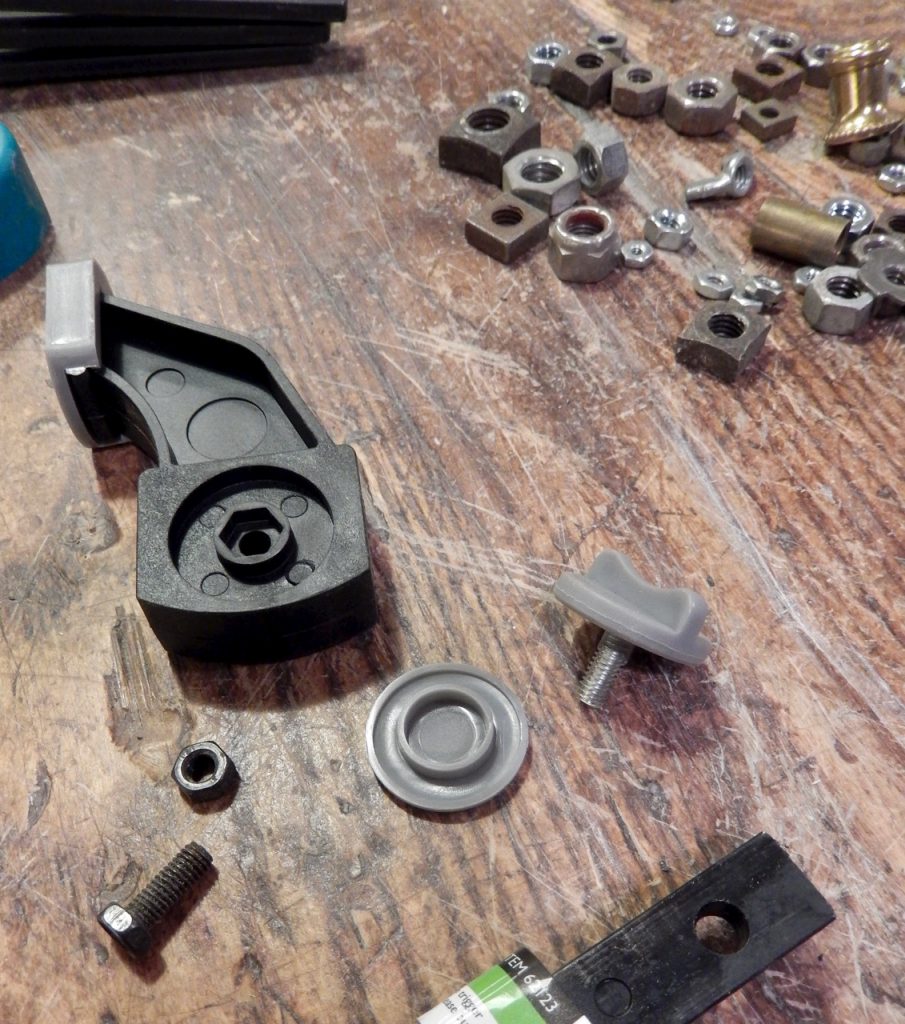
The jaw of this type of quick-action bar clamps is held by a gray thumb screw and a matching nut. This nut got lost during shipping. I found a replacement nut (black color) among our pile of miscellaneous nuts that I have been keeping over the years.
A word of advice: Consider making use of this story to convince your co-worker, spouse or partner that your inventory of “unused” stuff (perhaps they foolishly call it “junk”) is actually a treasure. We just need to wait patiently and – behold!
Here are some supplies and tools we find essential in our everyday work around the shop. We may receive a commission from sales referred by our links; however, we have carefully selected these products for their usefulness and quality.







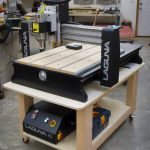

I have kept an old Half & Half tobacco can full of hardware my father had before he passed away in 1975. I don’t often have to dig into it, but on occasion I do and can usually find just what I needed, albeit a bit rusty. I’ve found it a good idea to have one of the square funnel things to dump the contents into, by the way, which I believe I purchased at Harbor Freight.
Since you teach woodworking, maybe one of the things you have students learn is how to make their own clamps. Woodworking always seems to require a little bit of metalworking, so…. There are plenty of people who make their own clamps and post their construction on the internet. I’ve made my own from scratch, beefed up flimsy clamps and repaired broken ones other people have discarded.
The comment from jqlouie falls within this scope.
If one of your class clamps breaks, have a student repair/replace it.
Not all tools need to be store bought. I can afford to buy any and all tools that I want but I get extra satisfaction from using tools I’ve made myself. Besides, making/repairing your own tools teaches you a lot about what a tool needs to be useful. It also makes you a better informed buyer if you do choose to buy off the shelf.
I buy them used whenever I can find them. It is really hard to break a C clamp and most of the old F clamps were of such good quality that the clamp makers put themselves out of business because you never needed to replace them.
I can only but agree with your sentiments, you must have a junk box with all your discarded, screws, nuts and washers etc etc, you never know when they will come in handy. I my case, I live in Sweden where Metric is the norm, so had no problem when I lost a nut from one of those “Harbour” Type clamps, there were plenty in my box.
Since then I have discarded a few of that type of clamp, but not before stripping them of the screw and nut, they have come in handy for lots of different repairs or constructions.
https://www.jackclamp.com
Manufactures clamps in Bozeman MT …
I’m a strong advocate of pipe clamps and own both 1/2 and 3/4 inch models and use them with varying lengths of pipe, including some maxi-length sectional clamps that I connect shorter pipe sections together and use in tandem with stiffeners for some longer jobs that require not only another hand, but another person due to distance (ie wall panels and shelving units). Lots of flex in those tandem hookups, but I don’t use them for tight joint connecting. While pipe-clamps can be heavy and a bit unwieldy at times, I’ve never had ANY of them fail me (HF or big-box brands) and storage is easy… pipes up on a bracket and heads/tails in a bucket or bin. Haven’t had real good luck with most of the HF long clamps due to the rather weak friction holding mechanism and flexing under clamping pressure, but perfect performance with all of their shorter clamps and all of their C-clamps.
I was the happy recipient of three large “Cristmas Cookie” tins full of miscellaneous nuts, bolts, screws, washers,etc. that my father had inherited from his father. I would guess it is about a 70-80 year collection. I haven’t needed it often, but on occasion it has been priceless.
For the most part, i consider the Harbor Freight clamps I have purchased poor quality and only reach for them if I have no alternative. However, their smallest F clamp turns out to be a great tool. I bought one when they were on sale for $2, tried it out, then went back for eleven more of them. A Lot of handy clamping for less than $25.
I was going to mention Dubuque as well but others have already beat me to the punch. As far as hoarding hardware, I agree with you wholeheartedly. For more than 20 years I’ve kept every spring, screw, nut, washer, and bolt that I’ve come across. As a result, I generally have a piece of hardware when I need it (not always, but most of the time).
More clamps made in the USA:
In addition to Universal brand bar clamps, Dubuque Clamp Works also makes Miro-Moose brand hand-screw clamps and cam-style, light duty F-clamps, as well as Universal brand Wedgegrip and Face Frame clamps and accessories, all in the USA.
Clamp Manufacturing Inc. in South El Monte, CA makes Kant Twist brand C-type, 3-jaw and hold-down clamps in the USA.
Milwaukee Tool and Equipment Company in Milwaukee, WI makes drop-forged steel or ductile iron C-clamps, and woodworking and other types of vises in the USA.
A few years back we found ourselves caught between best quality vs. economics, and purchased the Harbor Freight’s aluminum bar clamps. We noticed that these bar clamps flexed with high torque. One of my students trimmed a piece of pine to fill the U-channel of the bar clamp, which eliminated the flex and allowed increased clamping force. This proved to be a frugal remedy for our needs.
About US clamp makers:
While they have a limited range and may not have been able to supply your specific wants, there is a US clamp manufacturer still operating (and hopefully prospering). Dubuque is an Iowa-based clamp manufacturer, sold through Amazon and a wide array of retailers. Their aluminum bar clamps are quite nice (and a great deal beefier than the flimsy version offered by Harbor Freight).